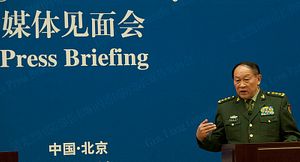After weeks of attention, especially from the U.S., China has issued new press cards to reporters from Bloomberg News and some, not all, of the New York Times’ journalists. Reuters reports that, although the cards have been issued, most of the reporters have not actually received their visas yet. Still, it’s good news for the over 20 journalists from Bloomberg and the Times who had been left in visa limbo, not knowing if they and their families would be allowed to stay in China for 2014.
During his early December visit to Beijing, U.S. Vice President Joe Biden publicly raised the issue of China withholding visas from this group of journalists. “Innovation thrive[s] where people breathe freely, speak freely, are able to challenge orthodoxy, where newspapers can report the truth without fear of consequences,” Biden said in remarks at the American Chamber of Commerce in Beijing, adding that the U.S. and China had “profound disagreements… in the treatment of U.S. journalists.” Biden also noted that he had raised the issue in his conversations with Chinese leaders, including Xi Jinping.
No doubt the administration will claim victory in this case, and it’s true that international attention and high-level diplomacy helped pressure China to allow the journalists to continue their work. But, as long-time China correspondent Evan Osnos noted earlier this month, actually expelling the journalists was not the end goal. “The real purpose is intimidation: to compel foreign news organizations to adopt a more compliant posture in their daily decisions, small and large,” Osnos wrote. In other words, China may be hoping that the mere threat of withholding visas will encourage journalists to be more accommodating in their coverage.
One such example of self-censorship was on international display in November, when the news broke that Bloomberg had elected not to run a report examining the relationship between top Chinese government officials’ relatives and a wealthy businessman. The journalists responsible for the story claimed that editor-in-chief Matthew Winkler believed Bloomberg couldn’t risk damaging its business interests in China by running such a story. Bloomberg already has first-hand experience of the damage a sensational media story can do — after Bloomberg’s 2012 story on the amassed wealth of Xi Jinping and his family, China’s government blocked access to Bloomberg’s website and told companies not to purchase Bloomberg terminals.
Winkler denied that the story had been killed for fear of upsetting the Chinese authorities. “The reporting as presented to me was not ready for publication,” he told the Financial Times. Yet despite his denials, the incident sparked a conversation about the role of self-censorship in China journalism.
Time magazine’s Beijing bureau chief Hannah Beech dismissed the idea that foreign correspondents self-censor in order to secure visas. Beech notes that, “compared with the turn of this century … the business of reporting in China has gotten much simpler.” Still, she believes that China opened the door for journalists to improve its image in the run-up to the 2008 Olympics, and now is trying to slam the door shut again. She also noted a sea-change in the way Beijing was dealing with the visa issue: “Previously, individual journalists have been punished for their enterprising reporting. This year, entire news bureaus from specific publications are being pursued.”
In this light, it’s especially interesting that there are still some New York Times reporters waiting on their press cards, while reportedly all of Bloomberg’s journalists have received their credentials. Bloomberg may in fact be reaping the rewards of its decision to kill a story that would upset the Chinese government. Given the hit Bloomberg took to its reputation over the issue, China may have felt compelled to give Bloomberg reporters their visas, so that other media outlets would see Bloomberg’s gesture wasn’t entirely unrewarded. As Bill Bishop wrote in his Sinocism Newsletter, “Bloomberg will look very stupid if there is not differentiated treatment between its journalists and businesses and those of the New York Times.” The fact that there is, at least for now, such differentiated treatment may be China’s way of signaling approval for Bloomberg’s cooperation.
Responding to Thomas Friedman’s open letter requesting renewed visa for U.S. journalists, the Global Times offered the Chinese perspective. For financial reasons, the editorial argued, “Western media have been trying to make breakthroughs from topics that the Chinese public is most concerned about… If successful, they will be at the center of China’s public opinion sphere.” The piece went on to argue that by doing this, the media outlets are part of “the West’s strategy in interfering China’s political agenda-setting and future policy orientation.” Because of this, “Chinese authorities are breaching their duty if they allow Western media to work in China unchecked.”
Interestingly, there is absolutely no hint in the Global Times article that the reports by Western media are false. In fact, the editorial admits that such stories are exactly what the Chinese public wants to see — and this is why the government needs to prevent them from being told. By allowing the Western media to investigate these topics, the government believes it is ceding control of political agenda-setting to outside forces. Beijing cannot allow this, particularly as it takes cautious steps towards economic reforms that could create separate destabilizing influences.

































